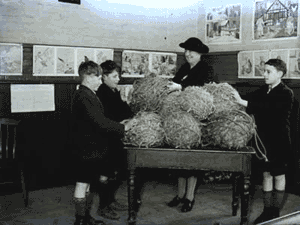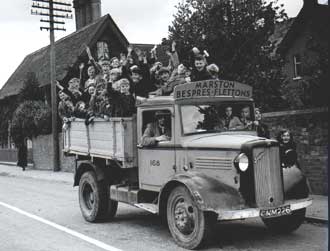 |
 |
 |
 |
 |
 |
 |
 |
 |
 |
 |
 |
 |
 |
 |
 |
 |
 |
 |
 |
 |
 |
 |
 |
 |
 |
 |
 |
 |
 |
 |
 |
 |
 |
 |
 |
 |
 |
 |
 |
 |
 |
 |
 |
 |
 |
 |
 |
 |
 |
 |
 |
 |
 |
 |
 |
 |
 |
 |
 |
 |
 |
 |
 |
 |
 |
 |
 |
 |
 |
 |
 |
 |
 |
 |
 |
 |
 |
Home
|
 |
 |
 |
 |
 |
 |
 |
 |
 |
 |
 |
 |
 |
 |
 |
 |
 |
 |
 |
 |
 |
Children would often unravel material in class if the teacher was busy. Here the children have collected twine for the war effort. ©Bedfordshire and Luton Archives and Records Service
|
 |
 |
 |
 |
 |
 |
 |
 |
 |
 |
 |
 |
 |
Children studied English, Maths, History, Geopgraphy, Music, Religious Education and had P.E. lessons. They would often learn songs and poems by heart. The head teacher was a lady named Miss Boswell; she was assisted by Miss Busby and Mrs Carter. A former pupil (Cecil Woodland) remembers Miss Boswell in his diaries: |
 |
 |
 |
 |
 |
 |
 |
 |
"...I quite liked Miss Boswell - she was a typical school mistress type, with spectacles, and her grey hair worn in a bun at the back. She sometimes referred to me as "our friend the artist" - Because I was well known for my drawings at school..." |
 |
 |
 |
 |
 |
 |
Miss Busby was remembered for playing the piano; all of the teachers were well liked. Former pupils have recounted how the teachers would warm the milk, that all children had mid morning, on the open fires in winter time and if children came to school with wet gloves the teachers would dry them next to the fire. |
 |
 |
 |
 |
 |
 |
School uniform was not worn during wartime. Children were allowed to wear whatever was available to them - often this meant wearing 'hand me downs' from older brothers or sisters. Boys had to wear short trousers all year round and many of them can remember feeling quite cold walking to school.
One former pupil can remember the shop at Brogborough acquiring a large supply of traditional miner's clogs. Almost everyone who lived in Brogborough bought these clogs for their family. When all the Brogborough children arrived at school in their new clogs there was a terrible din from the noise they made on the hollow wooden floors and the clogs were banned from the school! |
 |
 |
 |
 |
 |
 |
 |
 |
 |
 |
 |
 |
 |
 |
 |
 |
 |
 |
 |
 |
 |
 |
 |
 |
 |
 |
 |
 |
 |
 |
 |
When people first moved to the new housing estate of Brogborough there was no school transport and therefore children were escorted to school on foot by their parents. One Ridgmont school pupil can remember walking to school from Brogborough when she was only five years old.
The parents of Brogborough formed a petition and took it to the brickwork offices whereupon Marston Valley Brickwork Company provided a lorry to take the children to school. Originally it was a tipper lorry but all lorries were taken by the government for the war and so it was changed to a bright orange flat back lorry - a green tarpaulin cover and wooden seats were added to make it more comfortable. There was a set of wooden steps at the back and the last man on pulled them up. |
 |
 |
 |
 |
 |
 |
 |
 |
 |
 |
 |
 |
 |
 |
 |
 |
 |
 |
 |
 |
 |
 |
 |
 |
 |
 |
 |
What did the Ridgmont children think of the newcomers from the Brogborough estate? Click on the photo to find out. |
 |
 |
 |
 |
 |
 |
 |
 |
 |
©Bedfordshire and Luton Archives and Records Service |
 |
 |
 |
 |
 |
 |
 |
 |
 |
 |
 |
 |
 |
 |
 |
 |
 |
 |
 |
 |
The children attending Ridgmont school only just had time to get used to the new children from Brogborough when the evacuees arrived. Some evacuees came by themselves and others were lucky enough to have their families with them. The evacuated children were split between the schools in the local area and quite a number attended Ridgmont. Their teachers, Mr Mountford and Mr Gray, came to the school with them. To accommodate the extra children the main hall was divided into two classrooms with a large curtain. |
 |
 |
 |
 |
 |
 |
 |
 |
 |
 |
 |
 |
 |
 |
 |
 |
 |
 |
 |
 |
 |
 |
 |
 |
 |
 |
 |
 |
 |
 |
 |
 |
 |
 |
Before the war all children went home for their lunch but during wartime school dinners were available in the village hall. |
 |
 |
 |
 |
 |
 |
 |
 |
 |
 |
 |
 |
 |
 |
 |
 |
 |
 |
 |
 |
 |
 |
 |
 |
 |
 |
 |
 |
 |
 |
 |
 |
 |
 |
 |
 |
 |
 |
 |
 |
 |
 |
 |
 |
 |
 |
 |
 |
 |
 |
 |
 |
 |














